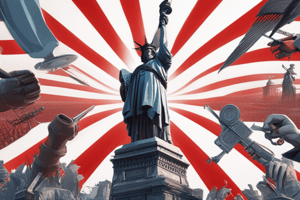Podcast
Questions and Answers
Which historical figure was instrumental in leading the German states towards unification?
Which historical figure was instrumental in leading the German states towards unification?
- Napoleon Bonaparte
- Peter the Great
- Otto von Bismarck (correct)
- Queen Victoria
What was one of the practical concerns that motivated the German Unification Movement in the early 1800s?
What was one of the practical concerns that motivated the German Unification Movement in the early 1800s?
- Cultural preservation
- Economic prosperity (correct)
- Religious freedom
- Educational reform
In response to Russian expansion in the 18th and 19th centuries, what did some ethnic groups seek?
In response to Russian expansion in the 18th and 19th centuries, what did some ethnic groups seek?
- Economic integration
- Autonomy or secession (correct)
- Cultural assimilation
- Military annexation
How did nationalism influence the balance of power politics in Europe after the Napoleonic Wars?
How did nationalism influence the balance of power politics in Europe after the Napoleonic Wars?
After World War II, what was the emphasis of international organizations like NATO and the UN?
After World War II, what was the emphasis of international organizations like NATO and the UN?
Study Notes
History of Nationalism in Europe
Nationalism is a powerful force that has shaped the course of European history throughout centuries. It refers to the idea of identifying with one's own nation, often expressed through feelings of loyalty and love towards it. This concept gained prominence during the French Revolution and its aftermath, when citizens began demanding self-determination based on national identity rather than traditional monarchical rule.
European nationalism can be traced back to various historical events and movements, including:
The Enlightenment Period:
During the 17th and 18th century, thinkers like John Locke and Jean-Jacques Rousseau laid the groundwork for future ideas of sovereignty and popular representation by arguing that governments derive their authority from the consent of the governed. These concepts would later be adopted by those calling for independence from imperial powers such as France and Britain.
French Revolution:
Following the American Revolution, the ideals of democracy and liberty spread across Europe, leading to the French Revolution in 1789. The revolutionaries demanded individual rights, representative government, and equal justice under law. Their success inspired similar revolutions elsewhere in Europe, notably in Germany where advocates of German unity were influenced by these events.
German Unification Movement:
In the early 1800s, various German states struggled against French domination and sought to unite into a single state, led by figures like Otto von Bismarck. While this movement was primarily motivated by practical concerns such as military strength, it also helped solidify a sense of shared nationality among Germans.
Russian Empire Expansion:
Throughout the late 18th and 19th centuries, Russia expanded its territory significantly, incorporating territories inhabited by diverse ethnic groups. In response to Russian expansion, some of these peoples formed nationalist movements seeking autonomy or secession from the empire.
Balance of Power Politics:
Nationalism played a key role in the balance of power politics that dominated international relations between major European powers from the end of the Napoleonic Wars until World War I. Each country tried to maintain its position relative to other countries, and this led to alliances being built around common linguistic, cultural, or religious bonds within regions or small coalitions.
As we move further into the 20th century, nationalism continued to play a significant role in shaping global affairs. For example, the rise of fascism and Nazi Germany saw a resurgence of extreme forms of nationalism, resulting in two world wars. After World War II, however, many nations worked together to create international organizations aimed at preventing another conflict on such a massive scale—organizations such as NATO and the UN emphasized cooperation over competition.
Today, while nationalism still exists and has its roots firmly planted in European history, it tends to focus more on promoting pride in local culture and heritage rather than stoking divisions. Despite this shift away from divisive forms of nationalism, numerous conflicts continue to arise due to competing claims over land or resources, highlighting both the enduring nature of human conflict and the complex relationship between national identity and political realities.
Studying That Suits You
Use AI to generate personalized quizzes and flashcards to suit your learning preferences.
Description
Explore the historical development of nationalism in Europe, from the Enlightenment Period to the modern era, encompassing key events like the French Revolution, German Unification Movement, and the impact on international politics. Learn about the evolution of nationalist movements and their influence on European history.




